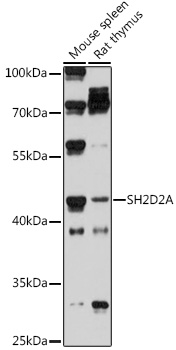Cell Biology Antibodies 18
Anti-SH2D2A Antibody (CAB18401)
- SKU:
- CAB18401
- Product Type:
- Antibody
- Reactivity:
- Human
- Reactivity:
- Mouse
- Reactivity:
- Rat
- Host Species:
- Rabbit
- Isotype:
- IgG
- Research Area:
- Cell Biology
Description
| Antibody Name: | Anti-SH2D2A Antibody |
| Antibody SKU: | CAB18401 |
| Antibody Size: | 20uL, 50uL, 100uL |
| Application: | WB |
| Reactivity: | Human, Mouse, Rat |
| Host Species: | Rabbit |
| Immunogen: | Recombinant protein of human SH2D2A. |
| Application: | WB |
| Recommended Dilution: | WB 1:500 - 1:2000 |
| Reactivity: | Human, Mouse, Rat |
| Positive Samples: | U-87MG, K-562, Mouse spleen, Rat thymus |
| Immunogen: | Recombinant protein of human SH2D2A. |
| Purification Method: | Affinity purification |
| Storage Buffer: | Store at -20°C. Avoid freeze / thaw cycles. Buffer: PBS with 0.02% sodium azide, 50% glycerol, pH7.3. |
| Isotype: | IgG |
| Sequence: | Email for sequence |
| Gene ID: | 9047 |
| Uniprot: | Q9NP31 |
| Cellular Location: | |
| Calculated MW: | 39kDa/40kDa/42kDa/44kDa |
| Observed MW: | 41kDa/43kDa |
| Synonyms: | F2771, SCAP, TSAD, VRAP, SH2D2A |
| Background: | This gene encodes an adaptor protein thought to function in T-cell signal transduction. A related protein in mouse is responsible for the activation of lymphocyte-specific protein-tyrosine kinase and functions in downstream signaling. Alternative splicing results in multiple transcript variants. |
| UniProt Protein Function: | TSAd: an adaptor protein that may facilitate and regulate interaction of KDR with effector proteins important to endothelial cell survival and proliferation. May play a role in the CD4-p56- LCK-dependent signal transduction pathway in T cells. Could also play an important role in normal and pathological angiogenesis. |
| UniProt Protein Details: | Protein type:Adaptor/scaffold Chromosomal Location of Human Ortholog: 1q21 Cellular Component: cytoplasm; cytosol Molecular Function:protein binding; SH3 domain binding; SH3/SH2 adaptor activity Biological Process: angiogenesis; cell differentiation; cell proliferation; positive regulation of signal transduction; signal transduction; vascular endothelial growth factor receptor signaling pathway |
| NCBI Summary: | This gene encodes an adaptor protein thought to function in T-cell signal transduction. A related protein in mouse is responsible for the activation of lymphocyte-specific protein-tyrosine kinase and functions in downstream signaling. Alternative splicing results in multiple transcript variants. [provided by RefSeq, Mar 2010] |
| UniProt Code: | Q9NP31 |
| NCBI GenInfo Identifier: | 143811460 |
| NCBI Gene ID: | 9047 |
| NCBI Accession: | Q9NP31.3 |
| UniProt Secondary Accession: | Q9NP31,O43817, Q5UBZ1, Q5VZS4, Q5VZS5, Q9UPA7, |
| UniProt Related Accession: | Q9NP31 |
| Molecular Weight: | 40,954 Da |
| NCBI Full Name: | SH2 domain-containing protein 2A |
| NCBI Synonym Full Names: | SH2 domain containing 2A |
| NCBI Official Symbol: | SH2D2A |
| NCBI Official Synonym Symbols: | SCAP; TSAD; VRAP; F2771 |
| NCBI Protein Information: | SH2 domain-containing protein 2A |
| UniProt Protein Name: | SH2 domain-containing protein 2A |
| UniProt Synonym Protein Names: | SH2 domain-containing adapter protein; T cell-specific adapter protein; TSAd; VEGF receptor-associated protein |
| Protein Family: | SH2 domain-containing protein |
| UniProt Gene Name: | SH2D2A |
| UniProt Entry Name: | SH22A_HUMAN |







